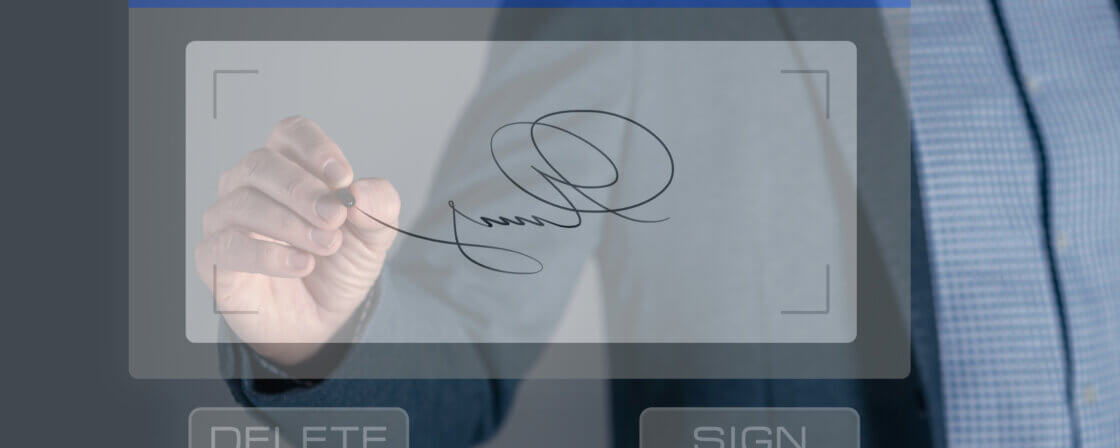What is an electronic signature and how does it work
An electronic signature is a digital means of confirming the identity of the signer and the integrity of a document. However, only a qualified electronic signature has the full legal weight of a handwritten signature. It is used to verify the identity of the person electronically signing a document and to ensure that the document has not been altered after signing. It is legally regulated in the eIDAS Regulation and in the Czech Act on trust services for electronic transactions.
From a technical point of view, the electronic signature relies on cryptography, i.e. mathematical encryption of data. Each signature is unique and linked to the person signing and the content of the document. This ensures that a signed file (e.g. PDF) cannot be modified after signing without invalidating the signature.
The difference between a digital signature and an electronic signature is that a digital signature refers to a technical process (cryptography), whereas an electronic signature is a legal concept – i.e. a result that has legal effects.
Are you solving a similar problem?
Need help with signing?
Not sure if your electronic signature has legal weight? Our lawyers can advise you on what kind of signature you need and verify that your signature meets the requirements of the law.
__service_button: I need advice
- When you order, you know what you will get and how much it will cost.
- We handle everything online or in person at one of our 6 offices.
- We handle 8 out of 10 requests within 2 working days.
- We have specialists for every field of law.
Tip for article
Tip: Digitalisation permeates all areas of our lives. Now all citizens have the possibility to present a classic ID card on their mobile phones. Read how this system of proving identity via eDocuments works.
How to obtain and set up an electronic signature step by step
First, you will choose a provider to obtain your electronic signature from. In the Czech Republic, these are qualified providers such as PostSignum (Czech Post), První certifikační autorita (I.CA) or eIdentity. On their website, you choose the type of certificate (for an individual or for a company) and the length of validity, fill in the application form and arrange the method of identity verification. Those who sign documents for work, contractual or official purposes usually choose a qualified electronic signature because it has the legal effect of a handwritten signature.
This is followed by identity verification, without which the provider will not issue you with a certificate. You can do this in person at a contact point, typically at a Czech POINT branch or at the provider’s contractual partner, where you will present your ID card and receive a certificate of identification. If you want to do everything fully online, many providers offer remote authentication via BankID: once you are redirected to your bank’s environment, you confirm your identity in the same way as when you log into online banking. The result is equivalent to a personal visit for the purposes of issuing a certificate.
Once your identity is verified, the provider generates and makes available a certificate for you. Follow the instructions to save this either to your computer storage or to a secure hardware device, typically a USB token or smart card. The installer guides you through the setup, or you create a PIN/password to protect the signature. It is recommended that you also make an export and secure backup of the certificate with the private key (if the type and rules allow it) to avoid complications when replacing your computer. After installation, it is a good idea to verify in a test file that the system “sees” the certificate and is ready for use.
The actual signing of documents is then done in normal applications. Most commonly, you open a PDF in Adobe Acrobat Reader and select “Certify” or “Sign”, then select your certificate, enter your PIN and save the signed file. There are also specialised tools, such as eSign FS or 602XML Filler, which can handle bulk signatures, time stamps or form work. After signing, the software will show you the “Signature is valid” status, including information about the certificate issuer and the time of signing; this makes it easy to prove that the document has not been changed after signing.
The entire process from selecting a provider, to identity verification, to certificate installation, to the first signature usually takes no more than 15 to 30 minutes, after which you can sign documents electronically from anywhere.
Free electronic signature: when it’s enough and when it’s not
Many users are looking for ways to get a free electronic signature. In practice, you can use a simple electronic signature – for example, typing a name into an email or inserting a scan of a signature into a document.
While these signatures have legal effect, they are not legally equivalent to a qualified electronic signature. Their validity and evidential strength is judged on the circumstances of the individual case, so they are not usually used for contracts, official filings or communication with the courts where a qualified signature is required.
The free solution is therefore only suitable for internal purposes. If you need a clearly legally valid signature, it is worth investing in a qualified electronic signature.
Setting up a qualified electronic signature usually costs between 400 and 800 CZK per year, depending on the provider and the length of the certificate. If you need a USB token or a smart card, the price can be higher (around CZK 1,000-1,500). Some companies also offer corporate licenses for multiple employees or bulk document signing.
Tip for article
Tip: An affidavit is one of the documents that almost everyone will encounter sooner or later. It may appear when dealing with tax matters, applying for social benefits, dealing with a bank or even when registering a child for kindergarten. We will advise you on how to draw it up.
The most common myths about electronic signatures
One of the most common misconceptions is that an electronic signature is the same as a scanned signature. However, this is not the case. A scanned signature, embedded in a document as an image, has no legal weight on its own unless it is accompanied by an electronic certificate that verifies the identity of the signer. Another common misconception is that all electronic signatures are equally valid. In reality, only a qualified electronic signature has the full legal effect of a handwritten signature, while a plain or guaranteed signature is judged on the circumstances of the particular case and has less evidentiary value.
The confusion between certified and qualified signatures is also a frequent source of confusion. A certified signature means an official verification of a handwritten signature, typically by a notary public or at Czech POINT. A qualified electronic signature is not its direct digital equivalent, but a separate legal instrument recognised throughout the EU.
Finally, there is the opinion that an electronic signature cannot be verified. The opposite is true – its validity can be easily verified, for example, in Adobe Acrobat Reader, which shows whether the signature is trustworthy, who issued it and whether the document has been tampered with after signing.
Summary
An electronic signature is a modern and legally recognised way to securely sign documents in a digital environment. It works on the principle of cryptography, which guarantees the uniqueness and immutability of the signed file. There are three main levels of electronic signatures – plain, guaranteed and qualified – with only a qualified electronic signature issued by an accredited provider such as PostSignum, I.CA or eIdentity having the full legal effect of a handwritten signature. It allows you to sign contracts, official filings or communication with courts, and is recognised across the EU. Getting a qualified signature is quick: after verifying your identity – in person or online via BankID – the provider will issue you with a certificate that you install on your computer or USB token. Signing is then done in common programs, such as Adobe Acrobat Reader, and its validity can be easily verified. While a simple signature (e.g. a typed name in an email or a scanned signature) can have legal effect in certain circumstances, it is not legally equivalent to a qualified signature and is not used for formal legal transactions. Investing in a qualified electronic signature, the annual cost of which is around several hundred crowns, is therefore worthwhile for anyone who wants to conclude contracts or deal with authorities quickly, securely and in full compliance with the law.
Frequently Asked Questions
How to create an electronic signature?
Using a certificate issued by the provider (PostSignum, eIdentity, etc.) and PDF signing software.
How to get a free electronic signature?
You can create a free electronic signature in the form of a simple electronic signature – for example, by inserting your name into an e-mail or scanning your handwritten signature into a document. Such a signature has some legal effect, but is not legally equivalent to a qualified electronic signature.
How to set up an electronic signature online?
With some providers, you can verify your identity via BankID and obtain a certificate without visiting a branch.
How to verify the validity of an electronic signature?
Open the document in Adobe Acrobat Reader – the program will show you if the signature is valid and who issued it.
How much does an electronic signature cost?
A qualified signature usually costs CZK 400-800 per year.




